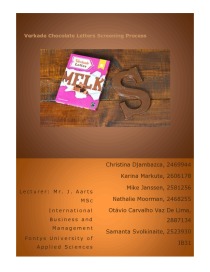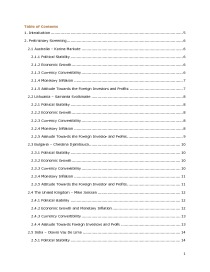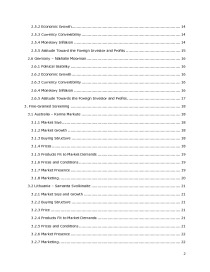Verkade Chocolate Letters Screening Process



Introduction. Preliminary Screening. Political Stability. Economic Growth. Currency Convertibility. Monetary Inflation. Attitude Towards the Foreign Investors and Profits. Lithuania – Samanta Svolkinaite. Political Stability. Economic Growth. Currency Convertibility. Monetary Inflation. Attitude Towards the Foreign Investor and Profits. Bulgaria – Christina Djambazca. Political Stability. Economic Growth. Currency Convertibility. Monetary Inflation. Attitude Towards the Foreign Investor and Profits. The United Kingdom – Mike Janssen. Political stability. Economic Growth and Monetary Inflation. Currency Convertibility. Attitude Towards Foreign Investors and Profit. India – Otavio Vaz De Lima. Political Stability. Economic Growth. Currency Convertibility. Monetary Inflation. Attitude Toward the Foreign Investor and Profits. Germany – Nathalie Moorman. Political Stability. Economic Growth. Currency Convertibility. Monetary Inflation. Attitude Towards the Foreign Investor and Profits. Fine-Grained Screening. Australia – Karina Markute. Market Size. Market Growth. Buying Structure. Prices. Products Fit to Market Demands. Prices and Conditions. Market Presence. Marketing. Lithuania – Samanta Svolkinaite. Market Size and Growth. Buying Structure. Price. Products Fit to Market Demands. Prices and Conditions. Market Presence. Marketing. Bulgaria – Christina Djambazca. Market Size. Market Growth. Buying Structure. Price. Products Fit to Market Demands. Prices and Conditions. Market Presence. Marketing. The United Kingdom – Mike Janssen. Market Size. Market Growth. Buying Structure. Prices. Products Fit to Market Demands. Prices and Conditions. Market Presence. Marketing. India – Otavio Vaz De Lima. Market Size. Market Growth. Buying Structure. Prices. Product Fit to Market Demands. Price and Conditions. Market Presence. Marketing. Germany – Nathalie Moorman. Market Size. Market Growth. Buying Structure. Prices. Product Fits to Market Demands. Prices and Conditions. Market Presence. Marketing. Conclusion. Bibliography. Appendix 1 The United Kingdom – Additional Information.
The company that is subject to this report is Verkade Koninklijke NV. It is a Dutch company, founded in 1886, operating in the chocolate and confectionery industry. It is currently a subsidiary for the British food company United Biscuits (United Biscuits, 2015). Moreover, the considered product for internationalization is the chocolate letters, which are sold around the Dutch holiday Sinterklaas. Since this holiday is popular only in the Netherlands and part of Belgium, the product will be introduced to the foreign markets as seasonality, sold during Christmas time. In the following, a screening process of six different countries/markets will be done in order for a decision about which market to enter to be made. Those countries are Australia, Lithuania, Bulgaria, The United Kingdom, India, and Germany. After that, a conclusion will be made stating the chosen market and assessing the market attractiveness as well as the company’s competitive strength.
The index of economic freedom of Australia is 81.4, which shows that the Australian economy is one of the freest in the 2015 Index. Australia has the 4th rank out of 42 countries in the Asia – Pacific region. Australia shows a very strong commitment to the economic freedom, which has resulted in a policy framework that has facilitated economic dynamism and resilience. In general, overall freedom of economy went down slightly over the past five years, but anyway the performance of the economy is very good in many of the 10 economic freedoms. Regulatory efficiency in Australia still is firmly institutionalized, and well – established policies of open market sustain flexibility, competitiveness, and also large inflows of trade and investment. The average tariff rate in Australia is 1.8 percent, and its non – tariff barriers are low. The financial sector is well – developed, which offers a big variety of financial instruments. The banking system remains stable, all banks are privately owned.
Australia’s economy grew slightly more than was expected in the third quarter as a steep increase in mining activity boosted net exports. According to the Australian Bureau of Statistics, the growth of economy was about 0.9 percent. On the other hand, if we compare the GDP from last year 3 months through September and this year, the index went up by 2.5 percent. However, Australia’s economic growth is expected to recover to 3 percent in 2017. Current fall in resource – sector investment will be balanced by strengthening utilization, non – resource sector investment and exports. Inflation of consumer price will go up constantly as the economic rise gathers impulse and the labour market starts tightening.
- Marketing Individual works
- Microsoft Word 320 KB
- 2020 m.
- English
- 45 pages (10751 words)
- College
- Karina

















